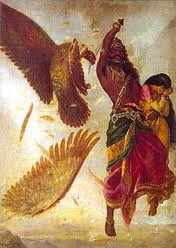Scribble City Central's thirty-fourth Fantabulous Friday comes from Sarwat Chadda, author of two bestselling YA novels about kickass Knight Templar girl Billi SanGreal, and also of the recently published Ash Mistry and the Savage Fortress, which I've just read and loved.
None of Sarwat's novels are for the squeamish. There's plenty of guts and gore - and other deeply scary stuff like the Carnival of Flesh, which has me hugging the duvet and jumping at creaky floorboards (but then I'm a complete wuss). I liked Billi very much indeed, but Ash is of a different order altogether, and I think a lot of teenage readers will relate to him. We've all come across the slightly overweight boy in the playground, prey to the bullies, not tough enough to stand up for himself, not confident enough to approach the girl he likes. That's Ash in a nutshell - but, of course, there's far more to him. Sarwat makes the arc of his transformation into ace kicker of demon butt completely believable - his bravery is motivated by love of his little sister - and I'm really looking forward to seeing more of him, Lucky and the delightfully cool and funny rakshasa Parvati in the next book, Ash Mistry and the City of Death. I only disagree with Sarwat on one thing - the off-road capabilities of the Ambassador car. Having gone over the Himalaya in one (on an unmade dirt road), I reckon they can tackle just about anything!
What this book also made me realise is that I really really need to delve deeper into the Ramayana and Mahabharata to further my shockingly scant knowledge of Hindu mythology. The terrifying Ravana plays a large part in the former, and here's Sarwat to tell you all about him.
R for Ravana
Big Bad Demon King
SC: Ravana, the demon king, is the BIG BAD of Indian Mythology. By a long way. Immortal, master of sorcery and the greatest warrior alive he cannot be killed by god or demon. He even once conquered Heaven and enslaved the gods. So wise that he wrote religious texts himself.
So we’re talking about brains, brawns and mystical powers.
He’s described as having ten heads (symbolic of his great learning) and twenty arms (equally symbolic of his awesome strength and fighting ability) and his body is marked by scars from his wars with the gods.
What I love about Ravana is that, even though he’s a villain, he’s honourable and his people love him. His city Lanka, is a blessed kingdom. One of the legends has him conquering the whole earth and bringing all the kings to his palace in chains to bow down before him.
But, like all villains, he has his weaknesses. Ravana had but two. Women and arrogance. When granted invulnerability he listed out all the things that could not hurt him. Gods, demons, beasts and titans. He didn’t bother to mention man, thinking humans too puny to ever be a threat to him. Big mistake.
Then he fell in love with Sita, wife of Prince Rama. He kidnapped her and snuck off to Lanka, hoping to persuade her to marry him. Big mistake Number Two. Rama just happened to be the greatest hero on earth and destined to be Ravana’s nemesis. As a human he bypassed Ravana’s shield of invulnerability and he was an avatar, a god in mortal flesh, which is just a bit special.
The tale of Rama and Ravana is recounted in the Ramayana, one of the two great myth epics of the Indian World. It’s got magic, mayhem and battles galore. Rama recruits an army of monkeys and the conquest of Lanka involves a war of unimaginable scale with Ravana wrecking havoc against Rama’s dwindling but heroic force. The book is about honour and above all guts. Standing up to Ravana. His army of demons, called rakshasas in Indian mythology, are not just a mindless horde. They are great characters themselves. Ravana’s brother, Vibeeshana, is good, and tries to persuade Ravana to hand Sita back, but even though he knows his brother is in the wrong he stays by his side to the bitter end, family loyalty exceeding all other duties and bounds.
I would compare it to the Iliad, both in scope and in humanity. Through the prism of Rama and Ravana we see the good and the bad overlap with all that is human, both the best and the worst. They are agents of destiny, like Achilles and Hector, but, in my mind, better matched. Hector’s doom is proclaimed loud and often and there is no doubt over Achilles’s superiority. There is no such certainly with Ravana. He is powerful. He is great. He is the perfect enemy, as wise, as heroic, as cunning as Rama.
SCC: Thank you, Sarwat. As I said above, there are now so many things I want to learn about and explore after reading both this and Ravana's starring role in Ash's story, and I hope others will as well. All the great epics - whether Greek, Norse or Hindu - are not only wonderful stories of bravery, heroism and the triumphs and failures of both human and godlike natures, but also treasure mines for the writer's imagination to dig in.
You can buy all Sarwat's books, including The Ash Mistry Chronicles HERE
Next week: Philip Womack chases after S for Satyr. I expect there'll be wine and merriment.




















3 comments:
My father and I saw part of Ravana's story in a programme about a form of traditional southern Indian theatre. At the time my father said, "The story is like some of Greek mythology". The presentation was quite different - highly formalised. It was fascinating but I don't think I could have sat through a performance. (It was all in Sanskrit and took hours!)
Yes, I do find all those parallels fascinating, Cat. I'm sure some scholar somewhere has done a comparative study of the Ramayana and the Iliad - if I was doing a PhD, that's the sort of thing I'd choose to look at. I suppose sitting through a long performance in Sanskrit is no different to sitting through, say, The Ring Cycle if you don't speak German. I always find that I pay more attention to the actors if I don't understand what they're saying. If it's a good interpretation, and you have some idea of the story beforehand, it can be almost more interesting.
I too feel woefully ignorant about the Ramayana and Hindu mythology, Lucy - thankyou to Sharwat and you - I must go and find out more.
Post a Comment